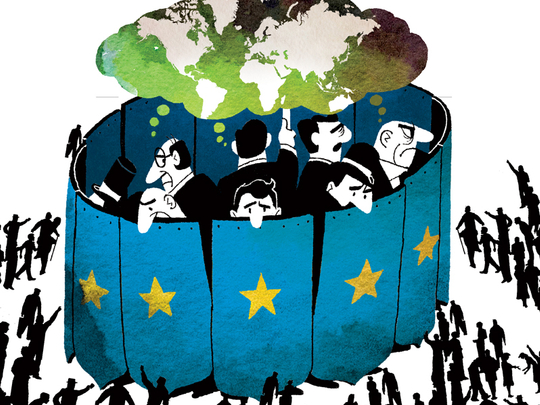
The terrorist attacks on Paris earlier this month have given rise to an explosion of nasty prejudice. According to one survey, anti-Muslim hate crimes quickly spiked 300 per cent in Britain — the vast majority of them directed against Muslim women and girls. The New York Times reports that the harshest effects of France’s state of emergency are felt by Muslims. The competitive rabble-rousing of Republican presidential candidates heard from across the Atlantic can only help in drawing a Maginot Line across minds and hearts in Europe — and fulfilling the wildest dreams of Daesh (the self-proclamed Islamic State of Iraq and the Levant).
It may be hard for some to resist the conclusion that Samuel Huntington was right and that we are on the verge of a worldwide clash of civilisations. But Europe’s long history of self-invention and resilience suggests other possible futures.
One should start with a sober, non-apocalyptic diagnosis: Europe’s once-mighty nation-states are undergoing a perilous transition, coping as they are simultaneously with shifts in demography, weakening of national sovereignty, shocks of economic globalisation and other radical changes in economy and lifestyles.
In other words, the process of knitting together countries through commerce and technology that originated in Europe and remade the world is now confronting the continent with formidable challenges in its own backyard.
Europe’s institutions were built to serve national interests within a circumscribed realm; they are now struggling to adjust to the new global realities of international terrorism, climate change, state-dissolution, mass immigration, refugee inflows, itinerant capital, digital media, transnational loyalties. Not surprisingly, a hundred contradictions have visibly bloomed.
For instance, take the issue of national sovereignty and identity, which can seem flexible and rigid at the same time. Politicians in Britain, while fully aware of the economic necessity of immigration, are locked into a false rhetoric about it along with far-right populists and their own conservative base. At the same time, the British economy is parasitic on foreign capital and the revolving door between the political realm and multinational business marks politicians themselves as members of a fully mobile global elite.
Despite ailing economies and large, disaffected Muslim immigrant populations, both France and Britain are unable to junk their imperial-era addiction to cowing rebellious natives with military firepower. France has been fighting a war on several fronts in recent years: Afghanistan, Cote d’Ivoire, Libya, the Central African Republic, Mali and now Iraq and Syria. But the record shows repeatedly that fighting extremists abroad does nothing to deter people at home from embracing extremism, and may even encourage it.
The malign minds of Daesh seem to have grasped more keenly how to use an interdependent and politicised world to their advantage. They simultaneously stoke sectarian hatreds in the Middle East and insinuate their message of self-empowerment through mass murder into the struggles of Muslim minorities for identity and dignity in European societies.
Out-of-the-box thinking
European democracies repeatedly fail to respond to their vicious violence with intellectual or moral coherence. The terrorist attacks on the offices of the satirical magazine Charlie Hebdo in Paris this January provoked many pious affirmations of the freedom of speech. Last month, however, the French high court upheld the criminal conviction of 12 political protesters, whose “crime” was advocating a boycott of Israel.
Of course, not all contradictions in social and political life can be ironed out. But out-of-the-box thinking can defuse the more volatile among them.
Italy’s mercurial prime minister Matteo Renzi showed some signs of it this week by proposing to allocate half of a proposed €2 billion (Dh7.78 billion) in new spending in response to the Paris attacks on a scheme that would encourage disenfranchised youth in suburbs of big cities to see themselves as part of Italian society and culture.
Angela Merkel’s unprecedented gesture to Syrian victims of violence is, of course, a much bolder gamble. Both she and Renzi seem to recognise that the old European model of the ethnocentric nation-state, in which citizens are frightened into voting for more isolation and antagonism to “foreigners” at home and abroad, threatens to become a recipe for both devastating conflict and economic decline.
Countries now linked with the globalised world will have to think more imaginatively about their unavoidably international future — one that is actually in accord with the ideals of the Enlightenment.
It is too easily forgotten that 18th century philosophies envisaged a cosmopolitan humanity. Today’s overly centralised and inflexibly Republican France would have appalled Voltaire, Rousseau and Kant — thinkers with very different visions of human society.
Europe is a work in progress rather than a perfect embodiment of the Enlightenment’s ideals. Its future hinges on whether it can find alternative policies to those that entrench and breed social and political antagonism and economic inequality. For it is becoming clear that failure could bring about, not only in Europe but also the world that Europe knit together, an endemic state of civil war.
— Washington Post












